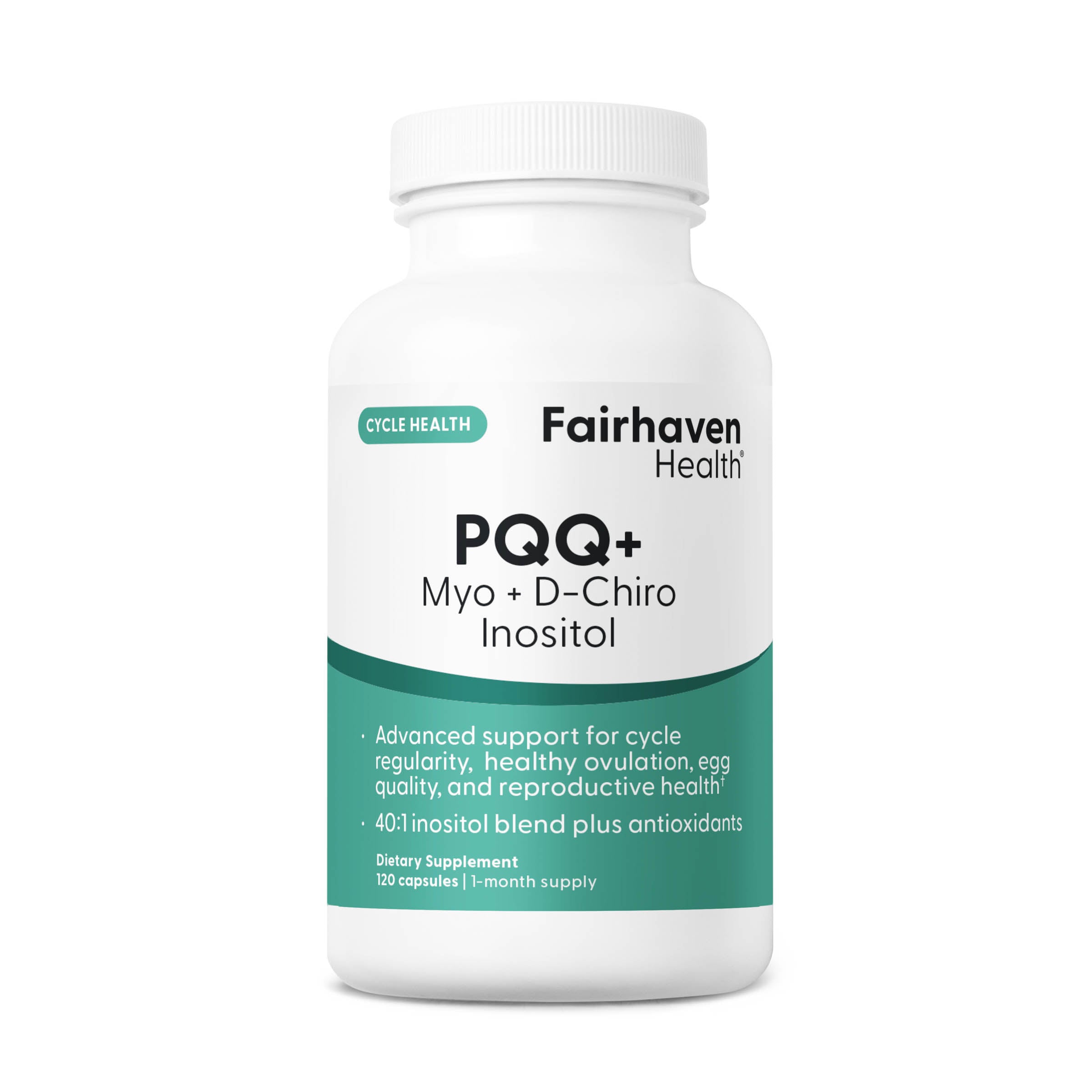By Dr. Chris D. Meletis
There is inherent wisdom within the human body to seek balance as the foundation of wellness and fertility. Women with Polycystic Ovarian Syndrome (PCOS) often have to work harder to keep their blood sugars in-check, maintain regular menstrual cycles so critical for optimal fertility, minimize androgens (like testosterone and DHEA) and control weight. Over the last 25 years of clinical practice, I have seen my patients with PCOS utilize a health promoting diet, lifestyle changes, and stress management as effective tools for achieving their fertility goals. Many PCOS patients have also used supplements, such as myo-inositol, to their advantage.
What is Myo-inositol (MI) and Why is it an Effective Tool for Fertility Enhancement?
Inositol is often referred to as Vitamin B8, although there is controversy about whether or not it officially qualifies as a B vitamin. Myo-inositol (MI) and d-chiro-inositol (DCI) are two forms of inositol frequently discussed related to fertility.
MI is particularly important for egg maturation, egg and follicular fluid quality. In fact, MI is involved a process called “phosphoinositides pathway signaling” and plays a key role in egg fertilization.
It has been shown that MI and DCI are often out of balance in women struggling with PCOS or infertility. In the case of PCOS, MI has been shown to help improve insulin sensitivity and help with achieving a more optimal lean body mass. As an added bonus, MI has been shown to help modulate follicular stimulating hormone (FSH) activity essential for both hormone regulation and the egg release cycle. These are critical considerations when seeking to optimize overall health and fertility.
Knowledge is Power!
As I share with my patients, knowledge is power; and when we are informed about the scientific facts it is easier to make an empowered, informed decision and stay motivated. A little background, both MI and DCI are found throughout the human body at different levels depending on the type of cells and tissues.
Myo-Inositol and Insulin Sensitivity
Imbalances in MI and DCI in the body can lead to sugar metabolism dysregulation. As reported in the International Journal of Endocrinology 2016:
“MI and DCI are isomeric forms of inositol that were found to have insulin-like properties, acting as second messengers in the insulin intracellular pathway; both of these molecules are involved in the increasing insulin sensitivity of different tissues to improve metabolic and ovulatory functions.”
In my clinical practice, I find supplementing with MI during pregnancy can help improve blood sugar parameters, as well as help with gestational diabetes. And, for many patients, MI supplementation also confers the added bonus of lowering androgen (for example, testosterone) levels, thereby decreasing acne and excess body hair.
Myo-Inositol – A Deeper Dive into the Science
For those of you who enjoy a little extra science, here are a couple of study excerpts from the medical literature.
In a 2014 scientific study, researchers speculated: “…that patients with polycystic ovary syndrome (PCOS) having hyperinsulinemia, present an enhanced MI to DCI epimerization (conversion) in the ovary, leading to MI deficiency that impairs FSH signaling, resulting in reduced oocyte quality.” They put that hypothesis to the test with a study of 20 patients with PCOS and 20 healthy women and they measured their MI and DCI levels in their follicular fluid.
The take home message of this 2014 study: Researchers discovered that the ratio of MI-DCI in follicular fluid dropped from 100:1 in healthy participants to 0.2:1 in patients with PCOS who additionally displayed significantly higher levels of insulin resistance, hyperinsulinemia, and luteinizing hormone. This points to the concept that MI supplementation could help regulate this imbalance in individuals with PCOS.
A 2015 scientific report explored further what happens within the ovaries when PCOS and insulin resistance are present in the body. The researchers hypothesized and then demonstrated that even when other tissues in the body display insulin resistance, the ovary does not display insulin resistance. The researchers noted that the ovary has the ability to convert MI to DCI, and that women with PCOS increase the conversion of MI to DCI to deal with sugar imbalances. This ultimately leads to DCI overproduction and MI depletion in women with PCOS, a condition the researchers labeled the “DCI Paradox”.
The take home message of this 2015 study: Women with PCOS can experience the DCI Paradox, which leads to overproduction of ovarian DCI levels and depletion of MI levels. This imbalance could be the cause of the poor oocyte quality and the impairment the activity of FSH that is so essential for ovulation signaling.
My Clinical Experience
Both MI and DCI can help with gaining control of PCOS symptoms and fertility challenges when combined with proactive diet and lifestyle modifications. My clinical experience has shown me that supplementation with myo-inositol can help women with PCOS to enjoy a high quality of life, improve their health indices and help level the playing field when it comes to optimal fertility. MI has been shown in the scientific literature and in clinical practice to help with egg quality, ovulation, androgen balancing, insulin sensitivity, augmentation of diet and lifestyle approaches to achieve a more optimal fertility weight and control the secondary symptoms of PCOS.
Dr. Chris Meletis
 Dr. Chris Meletis is an educator, international author and lecturer. His personal mission is “Changing World’s Health One Person at a Time.” Dr Meletis has authored 18 books and over 200 national scientific articles in journals including Natural Health, Alternative and Complementary Therapies, Townsend Letter for Doctors and Patients, Life Extension, Natural Pharmacy, and PubMed.gov articles.
Dr. Chris Meletis is an educator, international author and lecturer. His personal mission is “Changing World’s Health One Person at a Time.” Dr Meletis has authored 18 books and over 200 national scientific articles in journals including Natural Health, Alternative and Complementary Therapies, Townsend Letter for Doctors and Patients, Life Extension, Natural Pharmacy, and PubMed.gov articles.
Dr. Meletis served as Dean of Naturopathic Medicine and Chief Medical Officer for 7 years for the National College of Naturopathic Medicine (now the National University of Natural Medicine). He was awarded the 2003 Physician of the Year by the American Association of Naturopathic Physician of the Year by the American Association of Naturopathic Physicians. He has a deep passion for helping the underprivileged and spearheaded the creation of 16 free natural medicine healthcare clinics in the Portland metropolitan area of Oregon.
References:
- Potential role and therapeutic interests of myo-inositol in metabolic diseases,” Biochimie. 2013 95:(10): 1811–1827,
- Myo-inositol administration positively affects hyperinsulinemia and hormonal parameters in overweight patients with polycystic ovary syndrome,” Gynecological Endocrinology 2008: 24 (3): 139–144.
- International Journal of Endocrinology Volume 2016, 5 pages.
- Hyperinsulinemia Alters Myoinositol to d-chiroinositol Ratio in the Follicular Fluid of Patients With PCOS Reprod Sci.2014 Jul;21(7):854-858. Epub 2014 Feb 4.
- How to Achieve High-Quality Oocytes? The Key Role of Myo-Inositol and Melatonin International Journal of Endocrinology Volume 2016:9 pages
- Reflections on inositol(s) for PCOS therapy: steps toward success Gynecol Endocrinol. 2015 Jul;31(7):501-5.







